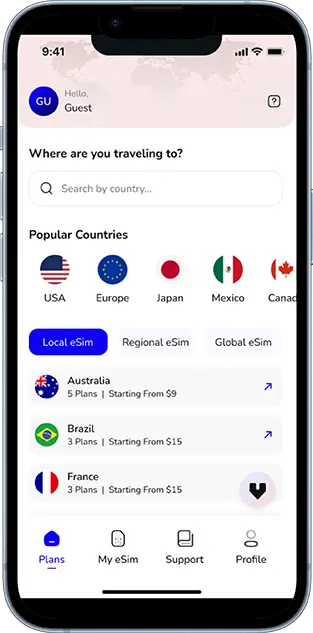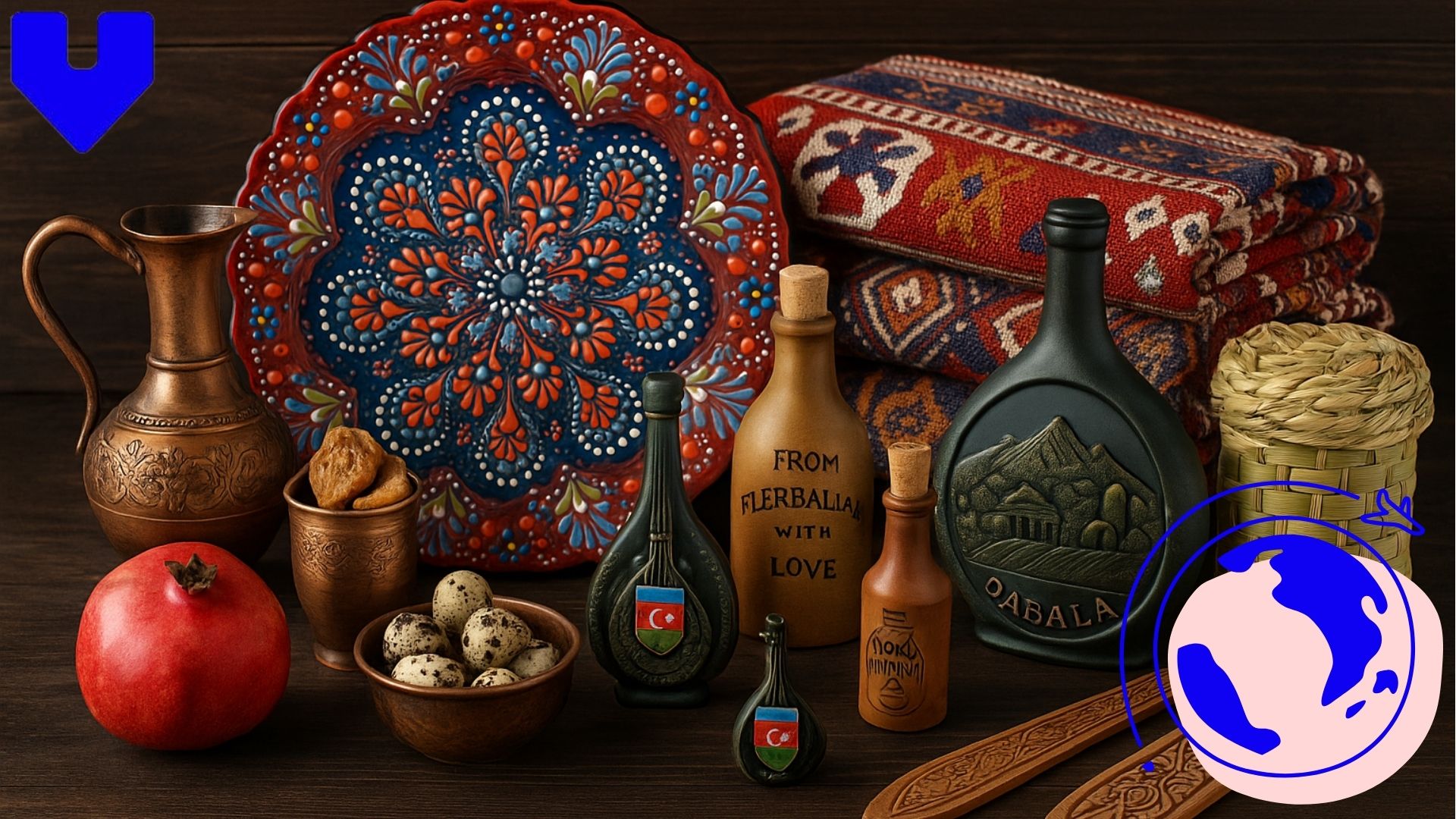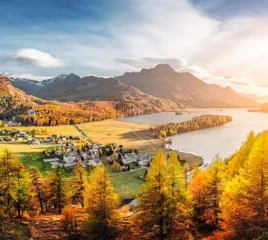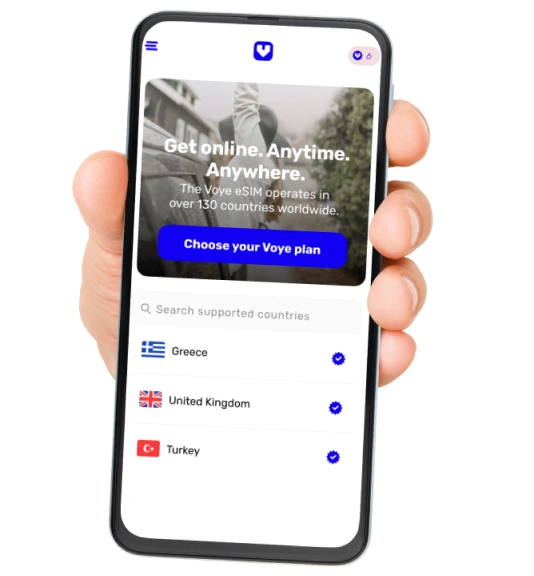Note that iPhone devices from Mainland China aren’t eSIM compatible. Also iPhone devices from Hong Kong and Macao aren’t compatible (except for iPhone 13 Mini, iPhone 12 Mini, iPhone SE 2020 and iPhone XS)
An immersive guide to the best handcrafted gifts, where to buy them, how to shop like a local, and how to travel smart across Azerbaijan with Voye Global. From copper teapots to silk scarves, discover Gabala’s most meaningful souvenirs and stay connected every step of the way.
The Soul of Gabala in Your Suitcase
Gabala isn’t a city that screams for your attention. It doesn’t have glass towers or chaotic bazaars. Instead, it whispers its story through walnut groves, centuries-old craft shops, and mountain paths that hum with history. Tucked into the heart of the Caucasus, Gabala (or Qəbələ) was once the capital of ancient Caucasian Albania, a crossroads of trade routes and cultures. Today, it’s a haven for those who want to escape the noise and bring home something more meaningful than mass-produced trinkets.
This isn’t a place for souvenir magnets stamped in factories. It’s a place where souvenirs are woven, forged, harvested, and sung into being. Whether you’re a collector of stories, a lover of folk art, or just a traveler searching for something memorable, Gabala offers keepsakes that carry depth, legacy, and soul.
What Makes Gabala’s Souvenirs Unique?
Gabala’s charm lies in its fusion of nature and tradition. Local artisans still work with their hands using techniques passed down through generations to shape materials like copper, silk, wool, and wood. The city and its surrounding villages remain deeply connected to the land, which means many of the items you’ll find here are made with local herbs, dyes, stones, and timber.
Here’s why souvenirs from Gabala stand out:
- They are region-specific. You won’t find the same styles in Baku or Sheki.
- Most are handmade in small batches. No two items are exactly alike.
- They support local communities. Many workshops are family-run or cooperative-led.
- They tell stories. Every motif, color, and material has cultural significance.
Whether it’s a hand-forged copper tray or a silk scarf dyed with pomegranate peel, buying a souvenir in Gabala means taking home a fragment of its living heritage.
Handwoven Carpets: Threads of History
If you buy only one thing in Gabala, let it be a locally woven carpet or rug. Azerbaijan is world-renowned for its carpet-making, and Gabala is no exception. The region’s carpets are distinguished by bold geometric designs, natural dyes, and a tight weave that ensures they last for generations.
What to Look For:
- Gabala-specific motifs: look for animal symbols, tree-of-life patterns, and stepped medallions.
- Vegetable-dyed fibers: rich hues from onion skin, indigo, pomegranate peel, and walnut husk.
- Thick wool pile or wool-on-cotton blends.
Carpet weaving is often done by women in nearby villages. If you’re lucky, you might get invited into a home workshop, where you’ll see a loom in action and maybe even meet the weaver herself.
Where to Buy:
- Gabala Carpet Workshop (near city center)
- Village co-ops: especially in Vandam and Bum
- Local Friday Market
Expect to pay anywhere from $70 for a small rug to several hundred for full-sized carpets.
Explore Gabala Uninterrupted
Stay connected while shopping, hiking, or bartering in the mountains.
Copperware and Traditional Metalwork
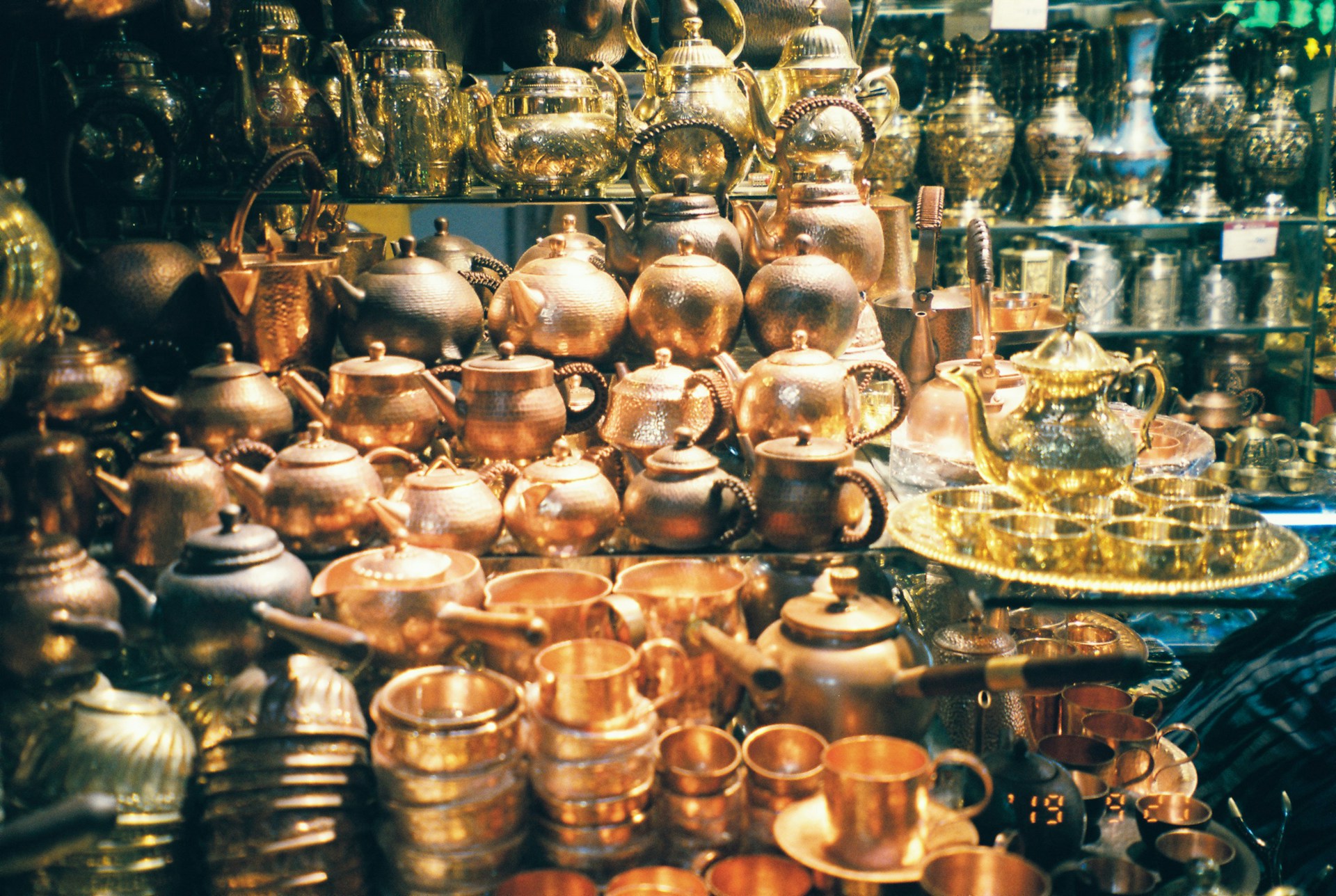
Gabala has long preserved its blacksmithing and metalworking traditions. From intricately engraved teapots to decorative trays, copper souvenirs from this region are both beautiful and functional.
You’ll see:
- Miniature engraved samovars
- Tea serving sets with floral etchings
- Hanging plates with animal and nature motifs
- Jewelry boxes lined with velvet interiors
What sets these pieces apart is their craftsmanship. Many are hand-hammered, with no two items looking identical. The deeper the engraving and the more uniform the hammering, the more valuable the piece.
Pro tip:
Hold the item to the light, quality copper will have a slight shimmer and feel warm to the touch.
Best Places to Shop:
- Artisan Street near Heydar Aliyev Park
- Market lanes in Vandam village
- Stalls outside the Archaeological Center
Local Honey & Forest Products
Gabala’s surrounding forests produce some of Azerbaijan’s most aromatic and medicinal honey. This is due to the high-altitude meadows and unpolluted air, allowing bees to gather nectar from wild herbs, forest blossoms, and chestnut trees.
Souvenir Honey Types:
- Chestnut honey – dark, rich, with a slightly bitter finish
- Wildflower honey – golden and sweet, ideal for tea or cheese pairings
- Herbal honey blends – mixed with thyme, mint, or chamomile
Locals also sell:
- Beeswax candles
- Herbal teas
- Pine resin products
- Dried mountain fruits (cherries, mulberries)
Most vendors bottle their honey in glass jars with handwritten labels, making them feel personal and heartfelt.
Where to Buy:
- Roadside stands en route to Nohur Lake
- Farm cooperatives near Laza village
- Gabala Central Market
Silk Scarves and Natural Textiles
While Sheki may be more famous for its silk production, Gabala holds its own when it comes to hand-dyed scarves and natural textiles. These scarves often showcase block-print patterns, hand-stitched borders, and locally sourced dyes.
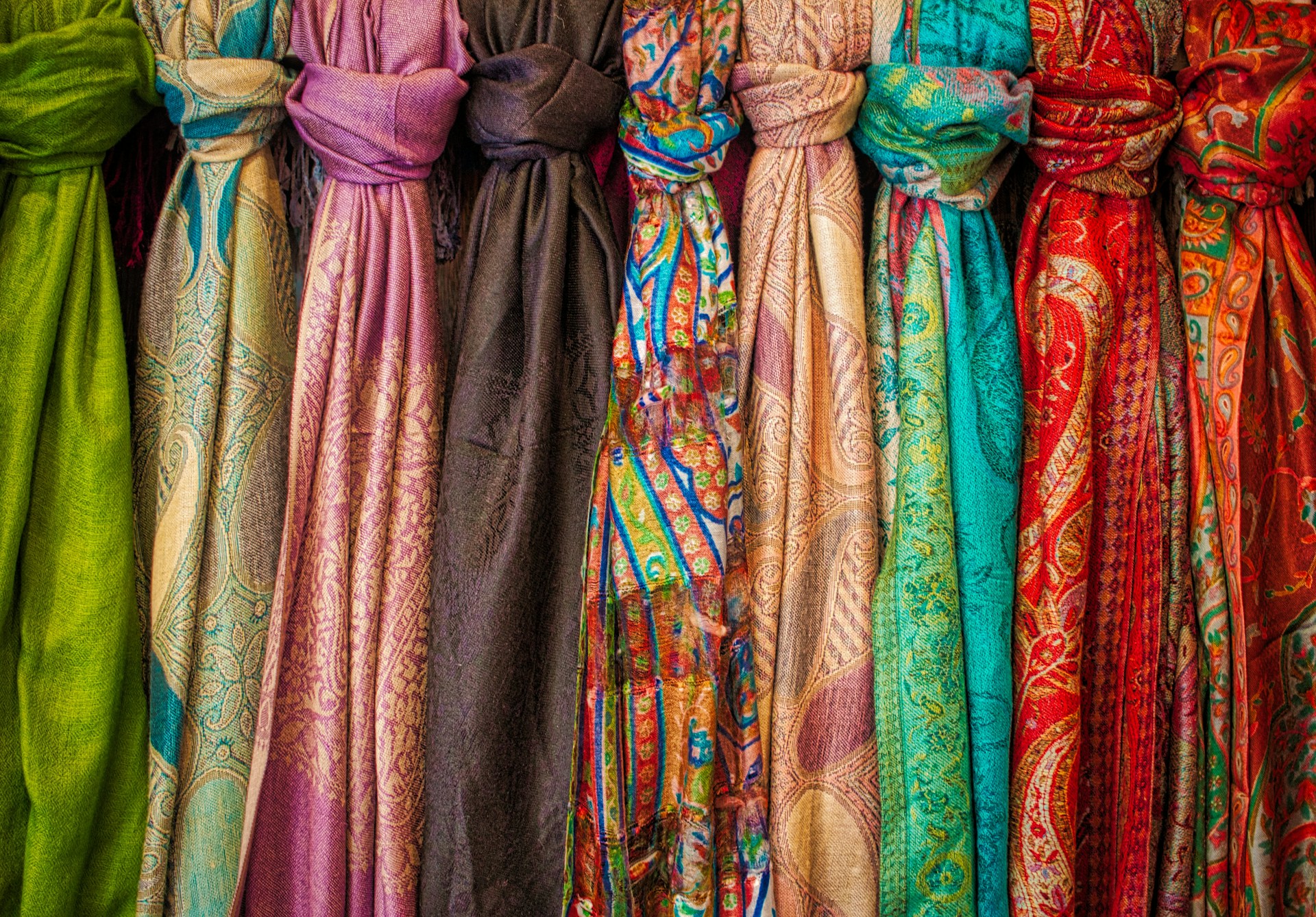
Popular designs include:
- Kelaghayi: Traditional women’s scarves printed with geometric or floral designs
- Naturally dyed shawls: Made with beetroot, indigo, or pomegranate
- Linen cloths: Used in kitchens or as table runners
Many of these items are produced in rural women’s collectives, where traditional methods are preserved and passed on.
Pro tip:
Ask the seller if they dyed the item themselves. Many will proudly walk you through their dye process and materials.
Wooden Instruments and Musical Keepsakes
Music is central to Gabala’s identity. The city even hosts the International Music Festival every year. Unsurprisingly, many souvenir shops sell handmade instruments that are either playable or purely decorative.
Types include:
- Tar – a plucked string instrument with a curved body
- Balaban – a wind instrument, often made of mulberry wood
- Naqara – small drums with goat-skin heads
These instruments are often hand-carved and painted. Some are full-sized, while others are scaled down for display.
Buy these if:
- You want a unique conversation piece
- You’re a music lover or collector
- You’re bringing back gifts for kids or teens
Regional Sweets and Preserves
Souvenirs don’t have to last forever; sometimes, the best ones are edible. Gabala offers an array of sweets that blend local ingredients with ancient recipes.
Must-Try Treats:
- Pakhlava: Denser and less sugary than Baku’s version
- Churchkhela: Walnut strings dipped in grape juice and flour paste
- Mulberry and rose petal jam: Often made fresh by village families
- Spiced dried fruits: Including apricots, plums, and figs
These make excellent gifts, especially when wrapped in printed cloths or packaged in wooden boxes.
CODE VOYE15 FOR SURE
Use VOYE15 at checkout for 15% off your travel eSIM.
The Roadside Economy: Souvenirs on the Way to Nohur Lake
As you drive from Gabala town center toward the peaceful shores of Nohur Lake, don’t rush the journey. The roadside itself is a living marketplace, scattered with small wooden stalls, folding tables, and even car trunks turned into makeshift shops.
What You’ll Find:
- Hand-bottled honey in reused glass jars
- Herbal tea bundles tied with a string
- Woolen socks and mittens, hand-knit by grandmothers
- Preserved fruits like mulberries, cherries, and figs
- Miniature carpets sold directly by the weavers themselves
What makes these stalls special is the direct connection to the maker. There’s no storefront, no markup, just real people offering the harvests and crafts of their day.
You won’t find signs or prices, and you probably won’t find Wi-Fi either. But you can find a connection with people, with culture, and with nature.
Keep your Voye Global eSIM for Azerbaijan active for maps and translation, and don’t hesitate to stop the car when you see something that catches your eye.
Seasonal Finds: What to Buy Depending on When You Visit
Gabala’s souvenir landscape isn’t static; it changes with the rhythm of the seasons, just like the forests and farms around it. Depending on when you visit, the souvenirs you encounter may be entirely different.
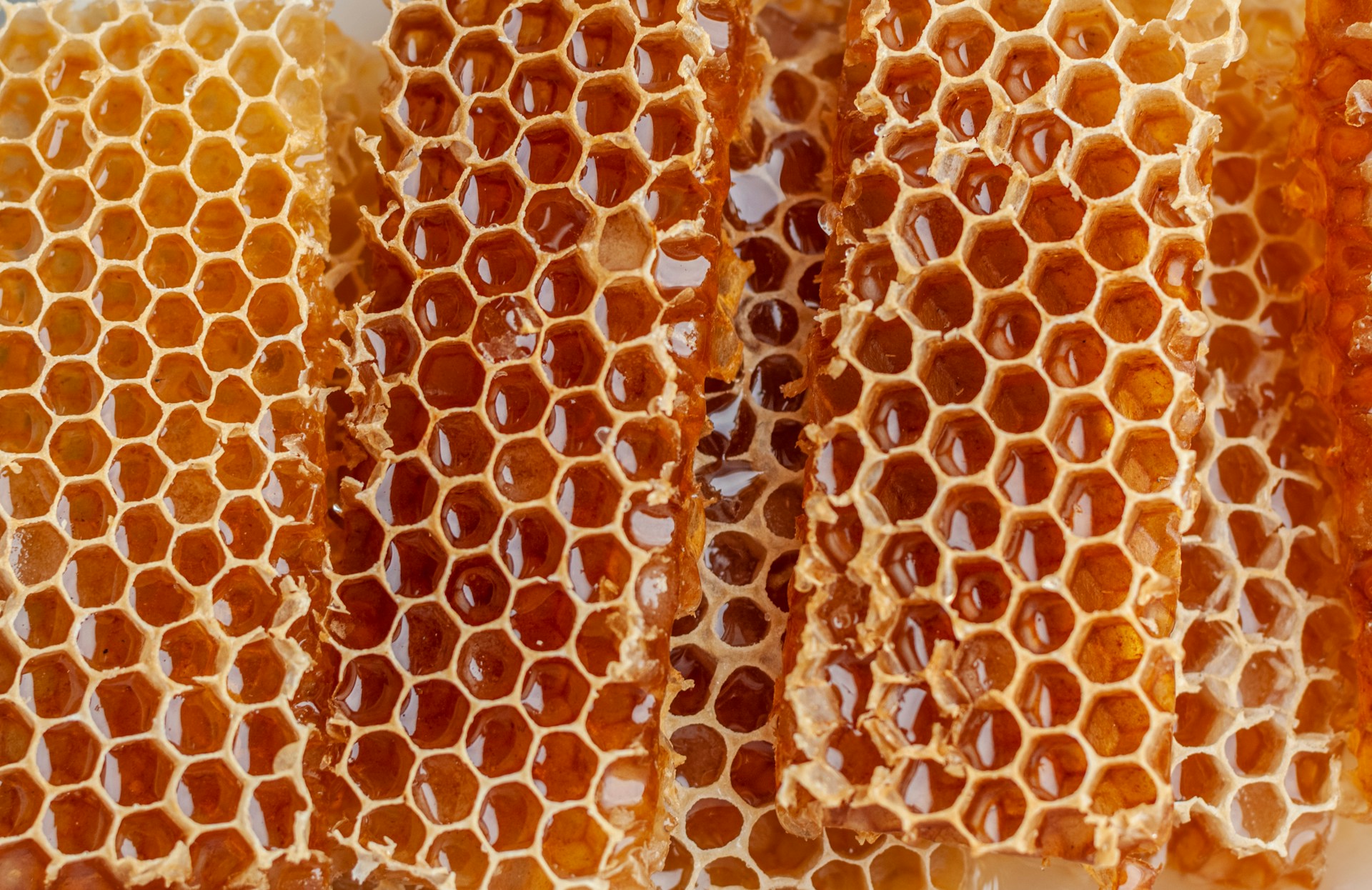
Spring
- Fresh herbal bundles: wild thyme, mint, and mountain chamomile
- Silk scarves dyed with the first pomegranate blooms
- Honeycombs freshly cut and minimally filtered
Summer
- Fruit leathers from cherries, plums, and mulberries
- Cooling linen shawls from women’s cooperatives
- Copper mugs and kettles forged for the festival season
Autumn
- Spiced jams and mulberry molasses
- Woolen goods like socks, gloves, and hand-woven rugs
- Churchkhela strings made with freshly harvested walnuts
Winter
- Dried citrus peels and medicinal tea mixes
- Scented candles in ceramic cups from local potters
- Carved wooden instruments, gifted often for holidays
Shopping with the season in mind adds meaning to what you bring home and gives you a better chance to find truly local, limited-edition items.
Gifts That Give Back: Ethical Shopping in Gabala
Souvenir shopping isn’t just about what you get; it’s also about who benefits from what you give. In Gabala, many of the most beautiful handcrafted goods come from community-based workshops, rural women’s collectives, and preservation-based artisan programs.
Look for:
- Kelaghayi scarves dyed by hand in family-run silk ateliers
- Pottery pieces made by young apprentices keep village traditions alive
- Embroidery and crochet are sold by elderly craftswomen supporting extended families
When you shop ethically in Gabala, you:
- Help preserve endangered crafts
- Empower local women and rural communities
- Encourage the continuation of sustainable practices
Ask where the item came from. Learn the story of who made it. And if you’re unsure, use your Voye Global eSIM to search the artisan group or cooperative online; many have a digital footprint now, even if small.
Gabala proves that conscious shopping doesn’t have to be a trend here; it’s a tradition.
Gabala Travel Guide for Souvenir Shoppers
Shopping in Gabala isn’t like browsing a department store. Here, you’ll find:
- Open-air markets
- Roadside artisans
- Cottage workshops
- Museum gift shops
When to Go:
- Spring and autumn: Best for outdoor shopping, as the weather is pleasant
- Fridays: Local markets have the widest selection and freshest items
Payment Tips:
- Carry small-denomination cash
- ATMs are available, but can be sparse in villages
- Most vendors don’t take cards or foreign currency
Cultural Etiquette:
- Greet shopkeepers with a smile and “Salam”
- Bargaining is expected, but do so politely
- Accept tea if offered—it’s part of the buying ritual
Getting Around:
- Taxi apps rarely work; arrange taxis through your hotel
- Voye Global’s eSIM helps you navigate offline maps and contact local drivers
Seamless Travel Across Azerbaijan
Forget local SIM shops, switch cities without signal drop.
Why Tourists Need Connectivity in Gabala?
Gabala is full of hidden treasures, but they’re not always easy to find. Unlike major tourist hubs like Baku, Gabala’s artisanal shops, rural workshops, and cultural experiences are often spread out, with little online presence or clear signage. This makes mobile connectivity essential for modern travelers.
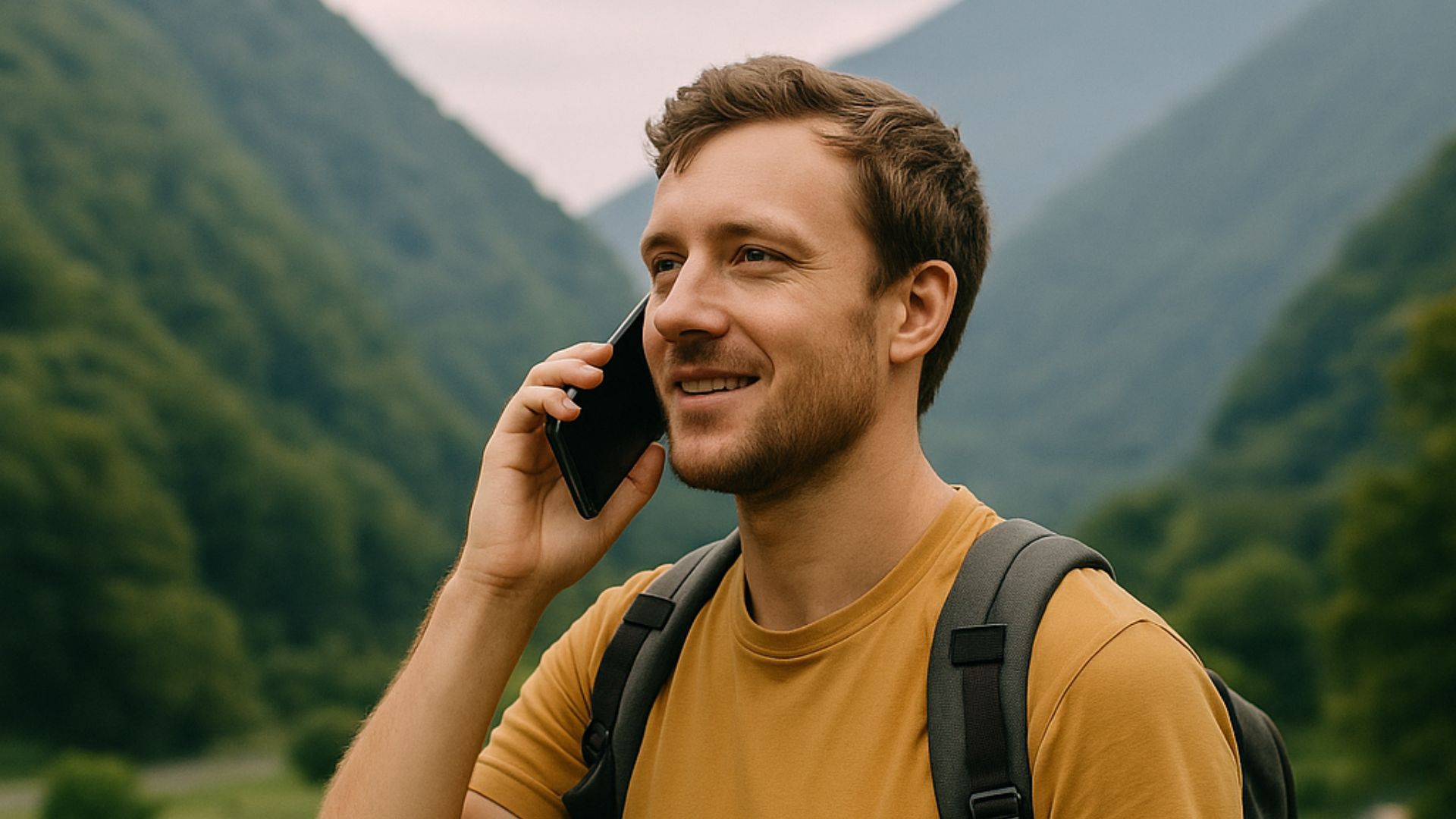
Here’s why staying connected in Gabala matters:
1. Navigation & Transportation
Public transport is limited, and rural signage is often in Azerbaijani only. Apps like Maps.me, Yandex Maps, or Waze can help, but they require a consistent internet connection. Using a Voye Global eSIM means you can search for directions, contact drivers, or rebook accommodations without Wi-Fi.
2. Communication with Locals
Most artisans don’t speak English. Having translation apps like Google Translate or SayHi at your fingertips can transform your shopping experience, helping you ask about materials, negotiate prices, or understand symbolic patterns in crafts.
3. Digital Payments & Currency Check
While many vendors operate on cash, some accept transfers or digital wallets, especially in semi-urban zones. Having mobile data helps check exchange rates, locate ATMs, or contact your bank.
4. Booking Craft Tours or Local Stays
Gabala’s boutique experiences, like pottery lessons, weaving demos, or cheese-making in nearby villages, often operate through messaging apps like WhatsApp or regional booking platforms. These require real-time access.
All About Voye Global’s Connectivity in Gabala
Voye Global isn’t just another travel tech company. It’s a dedicated eSIM provider that understands the unique challenges of exploring diverse, offbeat regions like Gabala and solves them with precision.
What Makes Voye Global Ideal for Azerbaijan:
Localized Network Partnerships
Voye Global’s eSIMs are built on partnerships with Azerbaijan’s most reliable carriers, ensuring fast and uninterrupted access even in rural towns, forested areas, and mountain passes. This is especially crucial in a place like Gabala, where signal quality can change quickly depending on elevation.
Flexibility for Multicity Travel
Whether you land in Baku and then drive to Gabala, or explore Sheki and Ismayilli along the way, Voye’s eSIM transitions smoothly across cities without requiring you to swap SIM cards or visit a kiosk.
Built for Travelers
Plans are designed for:
- Short-term tourists
- Long-term backpackers
- Families traveling together
- Digital nomads and solo explorers
There’s no complex onboarding or retail dependency, just instant, secure, reliable mobile data.
Dual SIM Compatibility
Using Voye Global’s eSIM means you don’t have to remove your primary SIM card. Your WhatsApp, OTPs, and banking apps remain active, while your Voye line handles all data and travel usage.
Why Travelers Prefer It:
- No physical SIM swap
- Compatible with all eSIM-enabled devices
- No surprise roaming fees
- Travel-tested for Gabala’s terrain and network coverage
Benefits of Using eSIM in Gabala
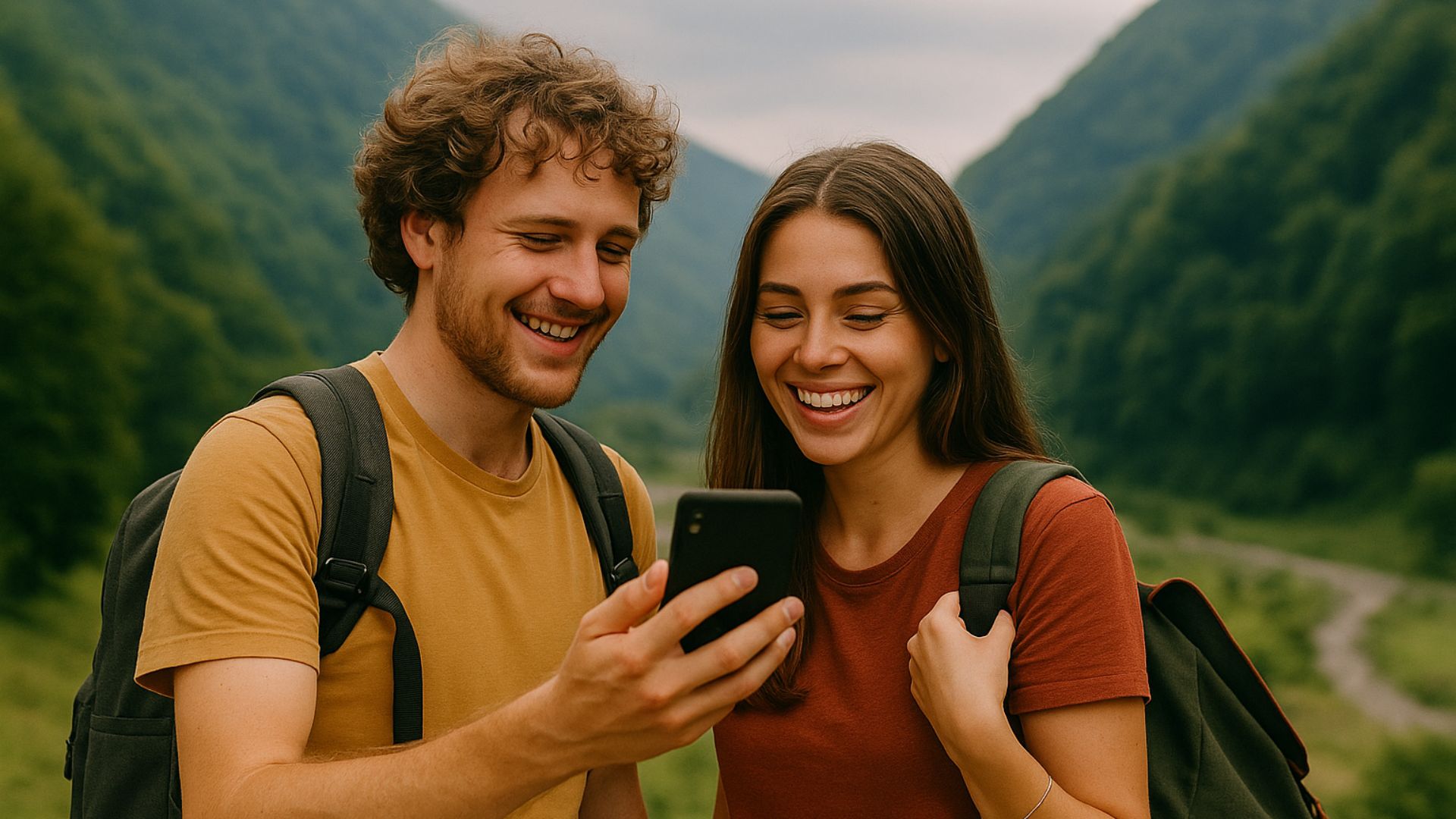
Let’s break down the clear, travel-focused advantages of switching to eSIM, especially if your trip includes smaller cities like Gabala.
No Airport SIM Hunt
Landing in a foreign country is hectic. eSIMs eliminate the need to queue at kiosks or hunt for a shop, particularly in places where English isn’t widely spoken.
Better Navigation on Arrival
Heading to Gabala from Baku? It’s a 3.5 to 4-hour drive through mountains and low-coverage stretches. A Voye eSIM allows you to stay online without gaps, ideal for GPS tracking and rideshare coordination.
Share the Experience Instantly
Gabala is incredibly photogenic misty lakes, old watermills, and craft shops built into mountain homes. With Voye Global’s eSIM, you can upload to social media or cloud storage in real-time.
Secure Online Purchases
Found something heavy or fragile? Some shops now ship internationally. Use your eSIM to confirm shipping, track packages, or get export documentation while still in-country.
Regional Flexibility
Many travelers visiting Gabala also explore Sheki, Lahij, or Gakh. Voye’s regional coverage ensures your connection doesn’t stop at city borders.
Gabala Coverage at Local Rates
Experience hassle-free connectivity wherever you go.
Essential Travel Tips for Souvenir Hunters in Gabala
Shopping in Gabala can feel a bit like treasure hunting. Here are some local tips to make the most of your experience:
1. Leave Room in Your Luggage
Gabala’s souvenirs aren’t small, especially if you’re eyeing rugs, copperware, or musical instruments. Bring a foldable duffel or leave extra space in your check-in luggage.
2. Use Manat, Not Dollars or Euros
Even though Azerbaijan is growing in tourism, most shops in Gabala do not accept foreign currency. Always carry small denominations of Azerbaijani manat (₼) for markets and roadside vendors.
3. Buy Early in the Day
Morning light is best for spotting quality in carpets, textiles, and honey. Plus, artisans are more open to negotiating when they’re fresh.
4. Learn a Few Local Words
Knowing words like “Salam” (hello) or “Neçədir?” (How much is it?) makes a big difference in small communities. Pair that with translation apps over Voye Global’s eSIM, and you’re good to go.
5. Consider Shipping for Large Items
Don’t want to haul a rug or copper pot in your backpack? Some shops now offer international shipping. Use your eSIM to coordinate delivery and confirm rates online.
Bonus Tip: Don’t Rush
Shopping in Gabala isn’t transactional, it’s relational. You might be offered tea, snacks, or even a family story as part of your buying experience. Stay a while.
Final Thoughts: Gabala’s Gifts Are Stories in Disguise
Souvenirs from Gabala aren’t just beautiful, they’re deeply meaningful. Every carved spoon, patterned shawl, or honey jar you take home carries the legacy of the Caucasus, shaped by artisans who live and breathe their craft. These are not mass-made products; they’re symbols of identity, of patience, and of generations working quietly to preserve a way of life.
This city doesn’t cater to trends. It caters to heritage. In Gabala, craftsmanship still matters. Hands still thread wool, polish copper, and bottle honey with care. A scarf is not just fabric; it’s a story. A jar of jam is not just sweetness; it’s a season, preserved.
You’ll find that some of the most meaningful experiences here happen in the quietest places: an old woman’s weaving corner, a forest path to a village stand, a conversation over tea after a purchase. These are the moments you’ll remember long after your trip ends.
And as you explore this stunning corner of Azerbaijan, stay open to the unplanned, the unlisted, the unrehearsed. The best souvenirs are often found off the main road, just like the best memories.
Let your journey be guided by curiosity, and let your connectivity support, not interrupt your experience. With Voye Global’s eSIM, you stay online when it matters: to translate, navigate, call a driver, or share that one-of-a-kind artisan story with friends back home.

Because the best souvenirs are the ones crafted by hand and carried with heart, and the best journeys are those where you never lose your connection to the world or the moment.
Frequently Asked Questions (FAQ)
What souvenir is Gabala famous for?
Gabala is best known for handwoven carpets, copperware, and forest honey.
Where to shop for handmade items?
Visit central markets, artisan villages like Vandam, and local co-ops.
Is bargaining acceptable in Gabala?
Yes, polite bargaining is part of the culture in open markets.
Can I pay with credit cards?
Mostly, no cash in Azerbaijani manat is preferred by local sellers.
Do I need mobile data to explore Gabala?
Absolutely. With Voye Global’s eSIM, you’ll access maps, translate, and book tours on the go.
How to ship big souvenirs home?
Some shops offer shipping. Use your eSIM to confirm details or track delivery.
When’s the best time to shop?
In spring and fall, especially on Fridays, markets are larger and more relaxed.
Seamless Mobile Data Everywhere
